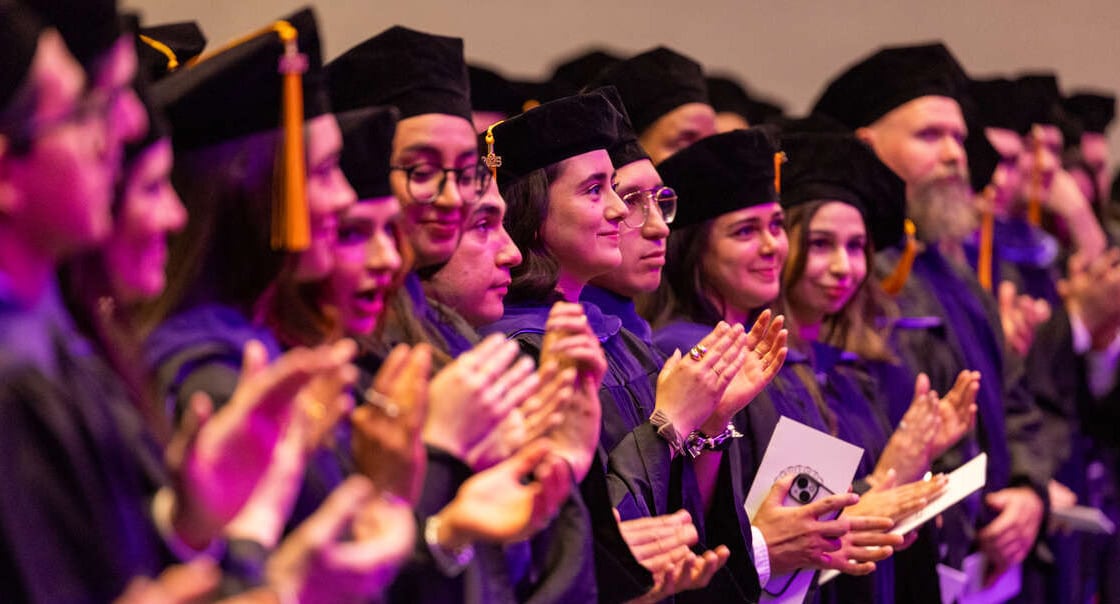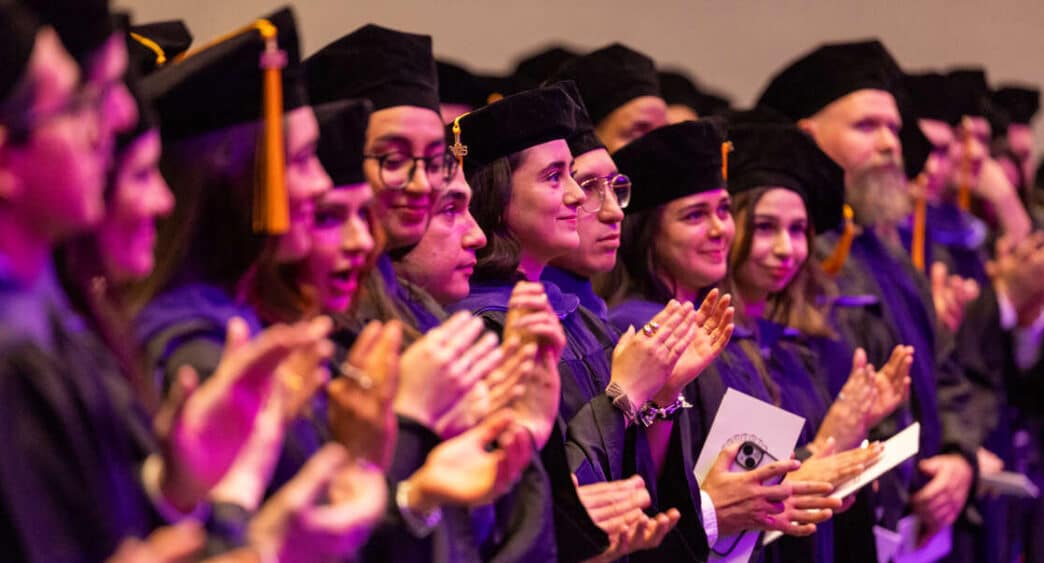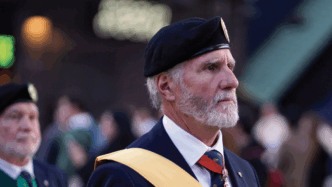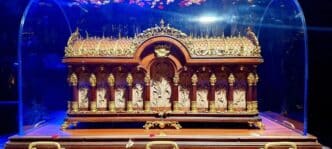U.S. Supreme Court Justice Amy Coney Barrett sat back in a gray armchair that matched her pantsuit and complemented her white-ruffled blouse. Nearly three years after being sworn in to serve on the nation’s highest court, she was speaking about the significance of Catholic law schools to law students in Washington, D.C.
“The topic of what it means to be a Catholic law school — just like what it means to be a Catholic university — is one that we as a faculty talked about a lot at Notre Dame,” Barrett, a former student and professor at Notre Dame Law School in Indiana, told students at The Catholic University of America Columbus School of Law, also known as Catholic Law, in 2023.
“We’re used to, in universities, having academic freedom and having all viewpoints on the table; and I think at a Catholic school you can feel particularly comfortable about bringing your religious or moral points of view to the table,” she said moments later. “That aspect of it really opens up more lines of inquiry than narrows or shuts them down because it invites, very explicitly, another perspective to the table.”
Today, the American Bar Association, the nation’s largest voluntary association of lawyers, recognizes 29 Catholic law schools. The deans of four of them — Notre Dame Law School, Catholic Law, University of St. Thomas School of Law in Minneapolis and Ave Maria School of Law in Naples, Florida — spoke with Our Sunday Visitor about what makes their law schools Catholic and how their faith-informed approach forms graduates.
While these Catholic institutions of higher education vary in age, size and geographic location, they pursue a common goal: Preparing students not only to serve as lawyers but also to live as saints.
“I would love every student who’s admitted to Notre Dame Law School to also be admitted to heaven,” G. Marcus Cole, dean at Notre Dame Law School, said. “I hope that we play some small role in helping them in that journey, but it’s less important to me that they remember us than it is that they embrace Christ and his offer of salvation.”
These deans spoke about how their schools include faith in their missions, cherish human dignity, recognize law as a vocation to serve the common good, and value community and supportive faculty while providing faith-based educational opportunities and student activities. They seek to educate the whole person.
“A person’s worth does not depend on extrinsic factors like grades, jobs, promotions, power or salary,” said Daniel B. Kelly, dean at St. Thomas Law, explaining what he hopes students take away from their education. “Rather, each student, each client and each person we encounter in the world has human dignity because each person is made in the image and likeness of God.”
Catholic, to these schools, also means lowercase-c catholic, or “universal.” They welcome students of all faiths and no faith at all and produce graduates who go on to practice in all areas of the legal profession.
Catholic law schools make up more than 60% of the 47 religiously affiliated law schools listed by the ABA. They comprise roughly 15% of all 197 institutions and programs that confer a law degree recognized by the ABA.
All four law schools that spoke to Our Sunday Visitor were included in a “most devout law schools” list published by the National Jurist’s PreLaw magazine in 2025.
St. Thomas Law
As a Catholic law school, St. Thomas Law “is dedicated to integrating faith and reason in the search for truth through a focus on morality and social justice,” its mission reads.
“Our mission as a Catholic law school begins with a proper understanding of the human person and all reality, including the dignity of the human person, the purpose of life and our ultimate end in the supreme Truth, who is God; sees the injustice of the world around us; and works to build a society of right relationship through just laws and policies,” Kelly said in emailed comments.
Academically, students can pursue a joint Juris Doctor and master’s degree program from the School of Law and the Department of Catholic Studies. The Terrence J. Murphy Institute for Catholic Thought, Law and Business, a partnership between the university’s Center for Catholic Studies and St. Thomas Law, “elevates Catholic intellectual engagement through scholarship, student and faculty development, public programming and ecclesiastical support,” Kelly said.
The school features a Prolife Center dedicated to the legal protection of human life. Another faculty member, Father Daniel Griffith, teaches Catholic social thought and restorative justice.
Law students can attend Mass, adoration, confession and more at the law school’s Chapel of St. Thomas More. Students can also join Catholic groups such as the St. Thomas More Society.
Catholic Law
Catholic Law promises to advance the larger university’s aims and goals.
“These aims and goals manifest themselves in a core commitment to the ideals of the dignity of each human person; respect for the inviolability of all human life; justice rooted in the common good; the recognition and protection of human rights as gifts of the Creator; care for the poor, the neglected and the vulnerable; and the obligation of love for one another,” the mission reads.
Academic excellence is part of their strategy, Dean Stephen C. Payne said in emailed comments.
“Doing both together — enhancing our academic reputation precisely by doing things distinctive to our Catholic identity and mission — is our superpower,” he said, citing their ranking (#71) in U.S. News & World Report’s best law schools for 2025.
Among its programs, the school offers a dual-degree program to earn both Licentiate in Canon Law and Juris Doctor degrees. Students can join groups, such as the St. John Paul II Guild of Catholic Lawyers, and attend daily Mass at Catholic Law’s Mary, Mirror of Justice Chapel.
Catholic Law has “strived to create a Catholic culture that is welcoming to all” and to provide “opportunities for the practice of the Faith … and intellectual and professional development in the Catholic intellectual tradition,” Payne said.
They boast centers informed by Catholic teaching, including the Center for Law and the Human Person, the Center for Religious Liberty, the Immigration Law and Policy Initiative and the Center for the Constitution and the Catholic Intellectual Tradition, which has hosted Supreme Court justices, including Barrett.
Notre Dame Law School
Established in 1869, Notre Dame Law School is the oldest Catholic law school in the country.
“We believe in the Gospel of Jesus Christ to our core,” Cole said. “We believe that our vocation as educators is to train what we call a different kind of lawyer, lawyers who see the practice of law itself as a vocation in service to God and service to God’s kingdom.”
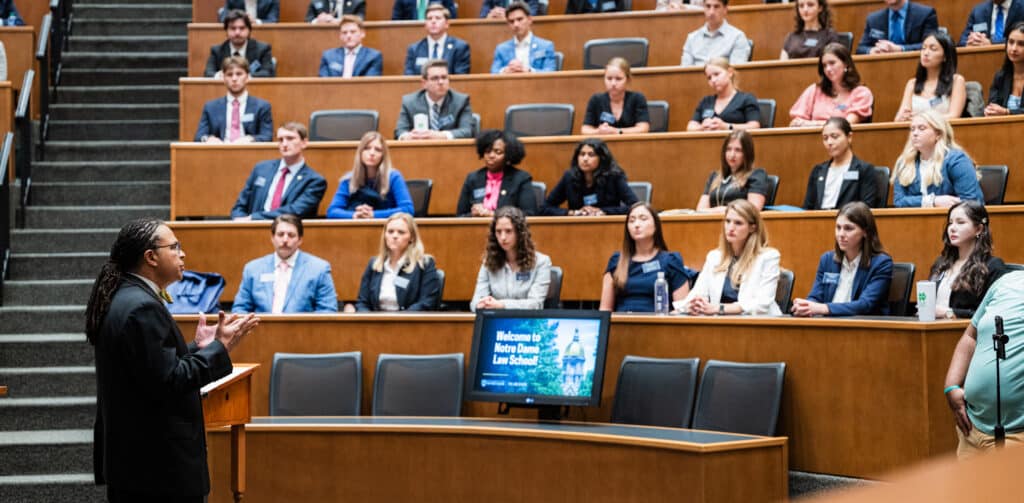
The school lists faith and service under its formation goals and promises to “encourage our students to consider the Catholic intellectual tradition and the role of faith in leading integrated and fulfilling personal and professional lives” and to “prepare our students to serve the community, especially the underprivileged, with dedication to human dignity and the common good,” among other things. The school offers a program on the intersection of Church, state and society.
Students can attend daily Mass at the St. Thomas More Chapel and join Catholic student groups including the St. Thomas More Society.
Cole said that, among other activities, the St. Thomas More Society brings in Catholic judges from across the country “to explain the role of their faith in their daily lives, including in their professional lives.”
Ave Maria Law
Ave Maria Law’s motto, “Fides et Ratio” (Faith and Reason) takes its inspiration from Pope St. John Paul II’s 1998 encyclical by the same name.
“He essentially says faith and reason are the two wings by which human beings ascend to meet God,” John Czarnetzky, dean and CEO at Ave Maria Law, said of the encyclical’s well-known introduction.
Ave Maria Law says it is the only U.S. law school that offers a concentration in natural law. It also provides daily Mass, weekly adoration and confessions twice a week, among other spiritual opportunities. The most popular student groups, Czarnetzky said, are the Lex Vitae (Law of Life) Society, which is devoted to the protection of human life, and the St. Thomas More Society.
“When we say that we are a Catholic institution, we mean in all aspects of our community,” he said.

Several faculty members serve the Holy See, including Czarnetzky, a lay Dominican and a third-degree Knight of Columbus. Their new chaplain, Father David Pignato, is a graduate from Harvard Law School. Bishop Thomas John Paprocki of the Diocese of Springfield in Illinois serves as an adjunct professor.
Czarnetzky said the school has the local bishop’s formal recognition as a Catholic institution. It also has recognition by the Cardinal Newman Society, a nonprofit that supports faithful Catholic education.
Advocates for humanity
The four law schools said graduates use their faith-informed education to serve the world in all areas of legal practice. They work in law firms, corporations, nonprofits, public interest work, the judiciary, government agencies and more.
“Every place lawyers go, we want our students to go,” Czarnetzky said.
In recent years, Ave Maria Law has recognized graduates such as Royce Hood, a pro-life attorney and strategist who founded the annual Law of Life Summit, and Erin Mersino, vice president and chief of Supreme Court and appellate litigation with Advocates for Faith & Freedom, with its Distinguished Alumni Award.
While Catholic Law graduates practice in all areas, Payne named recent clerkship placements including the D.C. Circuit, the 5th Circuit and the 11th Circuit. Some graduates, he added, pursue faith-based advocacy work, such as at the Becket Fund for Religious Liberty, a legal institute dedicated to the free expression of all faiths.
At St. Thomas Law, Kelly highlighted three alumni. Christopher Motz serves as senior counsel for First Liberty Institute, a legal organization dedicated to defending Americans’ religious liberty, and as a judge advocate general for the Air National Guard. Jenny Kraska is executive director of the Maryland Catholic Conference, a public policy entity for the Church. Andrew Rydlund is vice president for advancement and legal at Saint Paul’s Outreach, a nonprofit that trains others to lead young people to Christ.
At Notre Dame Law School, Cole said that they have graduates in every area of law and business and that they are “a leading law school in the country with regard to placing graduates into federal clerkships and state Supreme Court clerkships.”
The school recognizes many notable alumni, including Barrett.
“We’re proud of her, not just of her professional accomplishment, but we’re proud of her as a person,” Cole said. “She is a true disciple of Christ.”

